Matthew a Commentary on His Handbook for a Mixed Church Under Persecution Review
In the Logos editions, these valuable volumes are enhanced by astonishing functionality. Scripture and ancient-text references appear on mouseover in your preferred versions, and citations link to other resources in your Logos library. Important terms link to dictionaries, encyclopedias, and a wealth of other resource in your digital library. The Passage Guide lists these commentaries' relevant sections for any text you're reading. Written report on the go using tablet and mobile apps. With Logos Bible Software, the well-nigh efficient and comprehensive research tools are in one place, so you become the most out of your study.
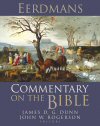
Eerdmans Commentary on the Bible
- Editors: James D. Thou. Dunn and John Rogerson
- Publisher: Eerdmans
- Publication Date: 2003
- Pages: i,649
Sample Pages: ane | two | 3 | 4 | 5 | half-dozen | 7
No one familiar with the Bible needs to be told that it is a truly remarkable work. But it takes assistance to sympathise this ancient collection of diverse forms of literature written by different people across many centuries. The Eerdmans Commentary on the Bible (ECB) is the finest, near up-to-engagement single-volume Bible handbook now available.
Written by world-class Bible scholars, the ECB encapsulates in nontechnical language the best of modern scholarship on the 66 biblical books plus the Apocrypha. The only one-volume Bible commentary to cover all the texts (even including i Enoch) regarded past one or more than Christian churches as canonical, the ECB provides reader-friendly treatments and succinct summaries of each section of the text that volition be valuable to scholars, students and general readers akin.
The primary objective of this work is to clarify the meaning of each section of the Bible. Rather than attempting a verse-past-verse assay (virtually impossible in a one-volume work), the ECB focuses on primary units of meaning—narrative, parable, prophetic oracle, department of argument, and and so on—highlighting their interconnectedness with the rest of the biblical text. The volume also addresses and answers major issues—including the range of possible interpretations—and refers readers to the all-time fuller discussions. Across providing reliable, informative commentary, this hefty volume also includes thirteen introductory and context-setting articles that practise justice to the biblical documents both as historical sources and equally scriptures.
The 67 contributors to the ECB come from a wide variety of backgrounds and are acknowledged leaders in the field of biblical studies. Their contributions stand up out either for their fresh interpretations of the bear witness, or for their way of request new questions of the text, or for their new angles of arroyo. While the translation of choice is the New Revised Standard Version, many of the contributors offering their own bright translations of the original Hebrew or Greek.
Cut-border, comprehensive, and ecumenical, the ECB is both a fitting climax to the rich body of interconfessional work undertaken in the latter part of the twentieth century and a worthy launching pad for biblical study in the twenty-showtime.
Comprehensive and ecumenical in scope and reader-friendly in format, the ECB is the finest, most upwardly-to-engagement unmarried-volume biblical commentary now bachelor. Written by well-known scholars, the ECB encapsulates in nontechnical linguistic communication the cutting edge of modern scholarship on the 66 biblical books of the Protestant canon plus the Apocrypha . . . Its succinct interpretations of the sacred books volition be helpful to scholars, pastors, students, and general readers . . . An invaluable 'one-finish' guide.
—Catholic Biblical Quarterly
The Eerdmans Commentary on the Bible will exist a rich and enduring resources for all who seek to understand the Bible in its literary, historical, and theological dimensions. The essays on biblical books are written by highly respected scholars and present the best fruits of recent inquiry in means that are engaging and persuasive. Moreover, the wide-ranging introductory articles will serve everyone from first students of Scripture to scholars wanting to refresh their knowledge. Recommended for churches, students, pastors, and scholars.
—Susan R. Garrett, dean of the seminary and professor of New Testament, Louisville Seminary
Utilizing the considerable talents of scholars representing a broad theological spectrum, the Eerdmans Commentary on the Bible provides readers with a concise, stimulating, sometimes provocative reading of the biblical text. I commend this book to all who want a handy scholarly resource as they grapple with the meaning of the text.
—Tremper Longman 3, professor of biblical studies and chair of the religious studies section, Westmont College
The Eerdmans Commentary on the Bible contains scholarship that is both international and ecumenical, including contributions from Catholics also as Protestants. Well-nigh of the contributors have well-established international reputations, and several are at the superlative of their field. Particularly welcome is the inclusion of the Apocrypha, 2 essays on the Dead Sea Scrolls, an introduction to the Pseudepigrapha, and even a commentary on 1 Enoch, which may be unique to a Bible commentary of this kind. The Eerdmans Commentary on the Bible is a very useful resources for college and seminary students and those who teach them.
—John J. Collins, Holmes Professor of Old Attestation Criticism and Interpretation, Yale Divinity School
James D. Thousand. Dunn is Lightfoot Professor Emeritus of Divinity at the University of Durham in England. His many books include Jesus Remembered and Beginning from Jerusalem and commentaries on Romans, Galatians, and Colossians and Philemon.
John Rogerson is professor emeritus of biblical studies at the University of Sheffield in England.
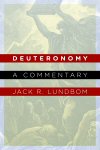
Deuteronomy: A Commentary
- Author: Jack R. Lundbom
- Publisher: Eerdmans
- Publication Date: 2013
- Pages: one,064
This milestone commentary past Jack Lundbom is intended for any and all readers who desire to better know and empathise the central Pentateuchal book of Deuteronomy, which has had a huge influence on both Judaism and Christianity over the centuries. For Jews, Deuteronomy contains the Decalogue and the Shema—"Hear, O Israel, the Lord our God is one" (6:four)—supplemented by a code of primal legislation.
Deuteronomy is much cited in the New Testament and has come to occupy an of import place in the life and doctrine of the Christian church. Information technology lifts upwardly of import wisdom themes such as humane handling and benevolence to the poor and needy and is rich in theology, calling repeatedly on Israel to reject other gods and worship the Lord alone equally holy.
Also drawing on language, archeology, and comparative Almost Eastern material, Lundbom's commentary employs rhetorical criticism in explicating the biblical text. Lundbom likewise cites afterwards Jewish interpretation of the book of Deuteronomy and makes numerous New Testament connections. An appendix contains all citations of Deuteronomy in the New Attestation.
Deuteronomy, though still relatively unknown, is now at the middle of the discussion of biblical theology. The great merit of Lundbom'southward commentary is that it will make accessible to a broad scholarly readership theological themes that are essential for both Judaism and Christianity.
—Dominik Markl, offshoot professor of biblical studies, Jesuit School of Theology
This exhaustive work includes a fresh translation kept shut to the Hebrew so equally to bring out rhetorical structures lost in English language since the Rex James Version. Each passage is accompanied by commentary, forth with abundant referrals to further scholarship, focusing especially on delimitation, framing, keywords, chiasms, and inclusios determined both from the rhetorical criticism Lundbom is known for and from testify in the aboriginal manuscripts. The extensive supplementary material at the start of the volume lays out moderate, cautious positions, conversant with the latest critical scholarship.
—Robert D. Miller III, associate professor of Old Attestation, Catholic University of America
Jack R. Lundbom is a life fellow member at Clare Hall, Cambridge University. Amidst his prior publications are Jeremiah Closer Upwardly and The Hebrew Prophets: An Introduction.
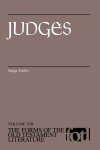
Judges
- Author: Serge Frolov
- Publisher: Eerdmans
- Series: The Forms of the Erstwhile Attestation Literature
- Publication Date: 2013
- Pages: 390
Sample Pages: 1 | 2 | 3 | 4 | 5 | half-dozen | 7
This commentary is the eighteenth published volume in The Forms of the One-time Testament Literature (FOTL)—a series that aims to present a form-disquisitional analysis of the books and units in the Hebrew Bible. Serge Frolov's valuable study of Judges, addressing both synchronic and diachronic perspectives, offers the first full-calibration form-critical treatment of Judges since 1922 and represents an important application of course criticism as practiced today.
Fundamentally exegetical, Frolov'southward work examines the structure, genre, setting, and intention of Judges. Focusing on the approved Hebrew text, Frolov argues that what we know as the book of Judges is non a literary unit of measurement merely rather a series of interconnected units that are for the near part closely linked to adjoining books. In particular, he shows how the sequence "apostasy-oppression-repentance-deliverance' traverses the boundary betwixt Judges and Samuel. Frolov also analyzes the history backside the grade-disquisitional word of this volume and exposes the exegetical process and so as to enable students and pastors to appoint in their own analysis and estimation of Judges.
Serge Frolov is Nate and Ann Levine Professor of Jewish Studies and acquaintance professor of religious studies at Southern Methodist Academy in Dallas, Texas.
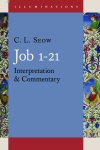
Task 1–21: Estimation and Commentary
- Author: C. 50. Seow
- Publisher: Eerdmans
- Series: Illuminations
- Publication Date: 2013
- Pages: 999
Sample Pages: 1 | 2 | 3 | 4 | 5 | half dozen | 7
The Hebrew book of Job is past all accounts an exquisite piece of literary art that holds its rightful place among the most outstanding compositions in world literature. Withal it is also widely recognized every bit an immensely difficult text to understand.
In elucidating that ancient text, this inaugural Illuminations commentary by C. 50. Seow pays shut attention to the reception history of Job, including Jewish, Muslim, Christian, and Western secular interpretations as expressed in theological, philosophical, and literary writings and in the visual and performing arts. Seow offers a primarily literary-theological interpretation of Task, a new translation, and detailed commentary.
The appearance of Leong Seow'southward marvelous, eclectic commentary on the volume of Job is an occasion for celebration. Information technology is the start critical commentary to give proper weight to reception history along with the philological and literary analysis necessary to back up judicious interpretation. Seow is a thorough and learned commentator with a neat center and ear for ambivalence and nuance. In add-on, his lucid and elegant writing is a pleasure to read.
—Alan Cooper, Elaine Ravich Professor of Jewish Studies, The Jewish Theological Seminary
Every bit in his masterful commentary on Ecclesiastes, Seow brings to the book of Job a rare combination of historical knowledge, linguistic expertise, patient attention to details, and a sense of existential and theological perspective. . . . The result is a commentary that is leap to go a classic in Job studies.
—J. Gerald Janzen, MacAllister-Petticrew Professor Emeritus of Former Testament, Christian Theological Seminary
This is easily the most comprehensive commentary available on the book of Chore. From detailed textual assay to creative and poetic interpretations, Seow provides a rich artery into one of our most complex biblical books. The breadth of scholarship is matched by the clarity and attractiveness of presentation. This will be a standard work for a long fourth dimension to come.
—Patrick D. Miller, professor of Old Testament theology in the Section of Biblical Studies, Princeton Theological Seminary
A lucid, extraordinarily erudite commentary.
—Michael V. Fob, Halls-Bascom Professor of Hebrew, University of Wisconsin
An outstanding masterpiece of philology, exegesis, and theological interpretation.
—Thomas Krüger, professor of Sometime Testament, Academy of Basel
One of the very all-time commentaries in the last hundred years. . . . Much of Seow's work will not need to exist redone.
—Michael D. Coogan, lecturer on Sometime Testament/Hebrew Bible, Harvard Divinity School
C. L. Seow is Henry Snyder Gehman Professor of Former Testament Language and Literature at Princeton Theological Seminary. A recognized expert in Erstwhile Testament studies and the general editor of the Illuminations series, he is also the author of the Ballast Yale Bible commentary on Ecclesiastes.
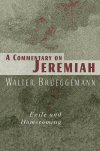
A Commentary on Jeremiah: Exile and Homecoming
- Author: Walter Brueggemann
- Publisher: Eerdmans
- Series: International Theological Commentary
- Publication Date: 1998
- Pages: 516
Sample Pages: one | 2 | 3 | 4 | five | six | 7
Jeremiah'southward poignant complaining over Judah'south social and religious disintegration reflects God's own pathos-laden yearning for his ill-behaved covenant people. In this widely praised expository commentary Walter Brueggemann, one of the premier Old Testament scholars of our time, explores the historical setting and message of Jeremiah equally well equally the text's relevance for the church today.
Offering a fresh look at the critical theological issues in the Jeremiah tradition, Brueggemann argues that Jeremiah's voice compels us to rediscern our own state of affairs, issuing an urgent invitation to faith, obedience, justice, and compassion.
This combined edition of Brueggemann's original two-volume work, published until recently every bit part of the International Theological Commentary series, is an essential resource for students, pastors, and general readers alike. It is reprinted here with a new introduction by Brueggemann that surveys the electric current state of Jeremiah studies.
The pastor and the seminary pupil will find this volume a very welcome addition to their library. Brueggemann's exposition of the text is adequate in its detail, and always lucid. Helpful footnotes direct the reader to farther reading on historical background and scholarly viewpoints . . . This volume is a very readable guide to Jeremiah and will appeal to a broad department of the market.
—Hebrew Studies
The author challenges us to explore the vocalisation of Jeremiah that is and then powerful and compelling, so passionate and uncompromising in its ache and promise, that it requires our submission to the text for a fresh discernment . . . A standard work for seminary students and pastors in parish contexts.
—Religious Studies Review
The author of a good book is a good partner in conversation. Brueggemann has made a major contribution to the extraordinarily circuitous continuing conversation with the author of the Book of Jeremiah. He consistently argues that this must exist a theological conversation, and his comments repeatedly increase the theological depth in which the book is understood . . . For this lively and provocative commentary Brueggemann is to be applauded.
—Cosmic Biblical Quarterly
This commentary will claiming all who use Jeremiah in preaching and teaching. Brueggeman challenges us to sympathize the prophetic writing in new ways that volition accept an bear upon on our use of the text in sermons and on our understanding of the gimmicky state of affairs of the church.
—Sharing the Practice
Walter Brueggemann is the William Marcellus McPheeters Professor Emeritus of Old Attestation at Columbia Theological Seminary in Decatur, Georgia. He is the author of numerous biblical commentaries and scholarly works, including A Social Reading of the Sometime Attestation, The Threat of Life, Theology of the Old Testament, and The Prophetic Imagination.
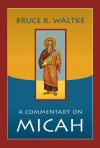
A Commentary on Micah
- Author: Bruce K. Waltke
- Publisher: Eerdmans
- Publication Date: 2008
- Pages: 508
Sample Pages: ane | two | iii | 4 | 5 | 6 | 7
In this masterful commentary, respected biblical scholar Bruce Waltke carefully interprets the message of the prophet Micah, edifice a bridge between Micah's ancient earth and our life today.
Waltke'south commentary on Micah quickly distinguishes itself from other commentaries on this volume by displaying an unprecedented exegetical thoroughness, an expert understanding of historical context, and a smashing interest in illuminating the contribution of Micah to Christian theology. Tackling difficult questions about engagement and authorship, Waltke contends that Micah himself wrote and edited the nineteen sermons comprising the book. Waltke's articulate analytical outline leads readers through the three cycles of Micah, each beginning with an oracle of doom and catastrophe with an oracle of hope, decisively showing that hope wins over doom.
Learned all the same amazingly accessible, combining scholarly erudition with passion for Micah's contemporary relevance, this book volition well serve teachers, pastors, and students alike.
If you are planning to preach or teach Micah, then by all ways buy this commentary! It will exist money well spent!
—Haddon Westward. Robinson, Harold John Ockenga Distinguished Professor of Preaching and president, Gordon-Conwell Theological Seminary
No one knows the prophecy of Micah more thoroughly than Bruce Waltke. No one is more deeply ingrained in the secondary literature that discusses and debates this prophet. No i is improve positioned to be a helpful guide to the correct interpretation and application of this marvelous volume. Information technology's rare when a commentary is helpful to scholars, clergy, and laypeople alike, but Waltke has achieved this masterfully.
—Tremper Longman III, Robert H. Gundry Professor of Biblical Studies, Westmont College
Bruce K. Waltke is distinguished professor of Erstwhile Attestation at Knox Theological Seminary in Fort Lauderdale, Florida, and professor emeritus of biblical studies at Regent Higher, Vancouver. He is the author of numerous books and Old Testament commentaries, including works on Genesis, Proverbs, and Micah.
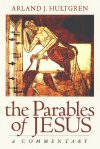
The Parables of Jesus: A Commentary
- Author: Arland J. Hultgren
- Serial: Bible in Its Give-and-take
- Publisher: Eerdmans
- Publication Date: 2000
- Pages: 552
Sample Pages: 1 | two | 3 | 4 | 5 | vi | vii
This inaugural volume in the Bible in Its World serial offers a comprehensive commentary on the parables of Jesus. Arland Hultgren'south outstanding piece of work features fresh translations of the parables in the Synoptic Gospels and the Gospel of Thomas, followed past interpretive notes and commentary on the theological meaning and significance of each parable for readers today.
After an introductory chapter on the nature of parables and their interpretation, Hultgren studies the 38 parables of Jesus thematically, exploring in turn "parables of the revelation of God," "parables of exemplary behavior," "parables of wisdom," "parables of life before God," "parables of concluding judgment," "emblematic parables," and "parables of the kingdom." He also discusses how the three evangelists used the parables inside the literary framework and theological interests of their Gospels. The book ends with a close expect at the parables of Jesus in the Gospel of Thomas.
Distinctive in the field for its scope of coverage and its goal of addressing the widest possible audience, this volume will be a valuable study resource for classrooms, churches, and general readers.
A readable and useful addition to both the student's and the preacher's library. Making thorough scholarship accessible to a very wide readership, this is a book to be strongly recommended.
—Theological Book Review
A solid piece of critical, exegetical, and theological work . . . Students and scholars alike will find this written report very useful.
—Message for Biblical Inquiry
Hultgren, a seminary professor, shows his familiarity with Christ'south parables in this disquisitional commentary. His exegetical comments are instructive and insightful, his style straightforward, and the argumentation easy to follow for avant-garde or novice students . . . This is a superb reference work for anyone wanting to study Christ's parables seriously.
—CBA Marketplace
The particular quality of this book, amongst the multitude of books on the parables, is the crispness of its presentation and of its judgments . . . Anyone who handles the parables in preaching or teaching volition find the book an ideal resource.
—Theology
An encyclopedic study of the parables of Jesus . . . There is something to learn (and probably something to challenge) in each of these contributions.
—Southwestern Journal of Theology
Hultgren . . . provides a comprehensive treatment of the parables in this quality volume . . . This fine volume gives the biblical student or informed lay reader a thorough and judicious overview of the extraordinary richness of the parables.
—The Bible Today
Arland J. Hultgren is professor emeritus of New Testament at Luther Seminary in St. Paul, Minnesota. Among his other books are Paul's Gospel and Mission: The Outlook from His Letter to the Romans, The Rise of Normative Christianity, and Christ and His Benefits: Christology and Redemption in the New Testament.
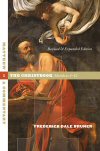
Matthew: A Commentary, vol. 1
- Author: Frederick Dale Bruner
- Edition: Revised and Expanded
- Publisher: Eerdmans
- Publication Date: 2007
- Pages: 652
Sample Pages: i | 2 | three | 4 | 5 | 6 | vii
Recognized as a masterly commentary when information technology start appeared, Frederick Dale Bruner'south written report of Matthew is now available every bit a greatly revised and expanded 2-volume piece of work—the result of seven years of careful refinement, enrichment, and updating.
Through this commentary, crafted especially for teachers, pastors, and Bible students, Bruner aims "to help God's people love what Matthew's Gospel says." Bruner'southward work is at once broadly historical and deeply theological. Information technology is historical in drawing extensively on great church teachers through the centuries and on the classical Christian creeds and confessions. It is theological in that it unpacks the doctrines in each passage, chapter, and department of the Gospel. Consciously attempting to bridge by and present, Bruner asks both what Matthew'due south Gospel said to its kickoff hearers and what it says to readers today. As a outcome, his commentary is profoundly relevant to contemporary congregations and to those who guide them.
Bruner'due south commentary is replete with lively, verse-by-verse discussion of Matthew'southward text. While each chapter expounds a specific topic or doctrine, the book'due south format consists of a vivid, original translation of the text followed past true-blue exegesis and critical analysis, a survey of historical commentary on the text, and electric current applications of the text or theme under study. In this revision Bruner continues to draw on the best in modernistic scholarship—including recent piece of work by West. D. Davies and Dale C. Allison Jr., by Ulrich Luz, and past many others—adding new voices to the reading of Matthew. At the same time he cites the classic commentaries of Chrysostom, Jerome, Augustine, Luther, Calvin, Bengel, and the rest, who, similar Bruner himself, were non simply doctrinal teachers just also careful exegetes of Scripture. Such latitude and depth of learning assure that Bruner's Matthew volition remain, as a reviewer for Interpretation wrote, "the almost dog-eared commentary on the shelf."
Volume 1 of Bruner's commentary is called The Christbook because the showtime 12 chapters of Matthew are focused on the nature and work of Christ. Every bit Bruner proceeds through these chapters, he shows how Matthew presents, step by step, central themes of Christology: Jesus' coming (chapters 1–4), his education (five–7), his miracles (8–9), his sermon on mission (ten), and his person (eleven–12). Throughout the book there are as well thoughtful discussions of significant topics such as baptism, marriage, Jewish-Christian relations, and heaven and hell.
Eminently readable, rich in biblical insight, and ecumenical in tone, Bruner's two-volume commentary on Matthew now stands among the best in the field.
Oftentimes Bruner's expositions are then rehearsed that the preacher will be tempted to elevator them whole into the sermon, for they bring the biblical message explicitly into the life of the congregation.
—Dialog
An excitingly readable and innovative commentary on Matthew by one of America's master Bible teachers.
—Samuel Hugh Moffett, professor emeritus, Princeton Theological Seminary
The value of Bruner's piece of work is that what he is doing is so desperately needed and and then rarely washed at the level of composure reflected in his two volumes.
—Perspectives in Religious Studies
This is a applied commentary for preachers and teachers in congregations . . . Marvelously successful.
—Currents in Theology and Mission
Frederick Dale Bruner is George and Lyda Wasson Professor of Religion Emeritus at Whitworth University and scholar in residence at Fuller Theological Seminary. His other books include A Theology of the Holy Spirit: The Pentecostal Experience and the New Testament Witness and The Holy Spirit: Shy Member of the Trinity.
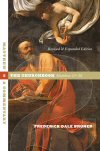
Matthew: A Commentary, vol. 2
- Writer: Frederick Dale Bruner
- Edition: Revised and Expanded
- Publisher: Eerdmans
- Publication Appointment: 2007
- Pages: 886
Sample Pages: 1 | ii | 3 | 4 | 5 | half-dozen | seven
Book ii of Bruner's commentary is called The Churchbook because Bruner sees Matthew 13–28 equally concerned primarily with the life of the church and discipleship. Continuing his showtime book (Christbook) exposition, Bruner shows here how the focus of Matthew shifts, from Jesus education about who he is to teaching mainly well-nigh what his church building is. Bruner'due south Churchbook commentary divides the second half of Matthew according to its major ecclesiological themes: the church's religion (chapters 13–17), the church'due south love (18–20), the church's history (21–23), the church'southward hope (24–25), and the church building'due south passion (26–28).
Eminently readable, rich in biblical insight, and ecumenical in tone, Bruner'due south 2-book commentary on Matthew now stands amid the best in the field.
This is the kind of commentary that I most desire—a theological wrestling with Scripture. Frederick Dale Bruner grapples with the text not only equally a technical exegete (although he also does that very well) but as a church building theologian, caring passionately about what these words tell u.s.a. about God and ourselves. Here he places his considerable pedagogy gifts at the service of the Christian community, caring equally much about u.s.a. every bit he cares about the text. His Matthew commentary is in the one thousand traditions of Augustine, Calvin, and Luther—expansive and leisurely, loving the text, the people in information technology, and the Christians who read it.
—Eugene H. Peterson, emeritus professor of spiritual theology, Regent College
It is hard to think of another commentary that is more fruitful in terms of stimulating the kind of thinking virtually the meaning of the text that is the prerequisite for good preaching and teaching.
—Journal of the Evangelical Theological Society
A hugely stimulating read . . . holds the reader's attention meliorate than many commentaries. Emphases on mission and formation of Christian character also brand this an of import and valuable contribution to scholarship on Matthew's Gospel.
—Themelios
Bruner is concerned with Christian germination, with the daily job of living faithfully inside today'south church. His applications of the Gospel of Matthew and his frequent excursions into contemporary dilemmas for the church, such as church-country relations, wedlock, liberation theology, feminism, and war, provide many stimulating insights for contemporary Christians.
—William H. Willimon, bishop of the North Alabama Conference of the United Methodist Church
Frederick Dale Bruner is George and Lyda Wasson Professor of Religion Emeritus at Whitworth University and scholar in residence at Fuller Theological Seminary. His other books include A Theology of the Holy Spirit: The Pentecostal Experience and the New Attestation Witness and The Holy Spirit: Shy Member of the Trinity.
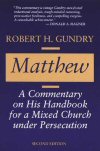
Matthew: A Commentary on His Handbook for a Mixed Church building under Persecution, 2nd ed.
- Author: Robert H. Gundry
- Edition: 2nd
- Publisher: Eerdmans
- Publication Appointment: 1994
- Pages: 744
Heralded every bit "an epoch-making volume" by F. F. Bruce when it start appeared, Robert H. Gundry's commentary on the Gospel of Matthew stands as a benchmark in biblical scholarship and modern methodology. No commentary in recent history has sparked such passionate discussion amongst evangelical scholars, and scholars of other persuasions have likewise paid considerable attentions to this work.
In response to the plethora of evaluations afforded this text since its publication in 1982, Gundry has issued this second edition. Included are an extensive new preface taking up criticisms that reviewers and other readers lodged against the first edition, a new appendix, and 225 new endnotes that expanded the commentary and provide fresh reflections on the text.
This assuming, well-informed written report retains the redaction-critical methodology of Gundry'southward original piece of work and the host of provocative interpretations that result. Elucidated afresh are Gundry's conviction that Matthew relied on the Gospel of Mark and the certificate "Q" and Gundry's arguments for a combination of historical information and theological embellishments in passages such as those that present the nascence of Jesus, the Sermon on the Mount and Peter's walking on the water. The new preface offers expanded evidence that Jewish literary tradition was concerned more than with theological development that with historical exactitude.
Gundry's Matthew now provides non merely truly engrossing biblical scholarship but too an excellent case of effective professional dialogue between academicians, Students, pastors, and theologians will find here a wealth of scrupulous hermeneutical research and thought-provoking answers to many open questions in textual studies.
A remarkable commentary on Matthew.
—Frans Neirynck, professor of New Testament and Christian origins, Duke University
Robert H. Gundry is scholar-in-residence and emeritus professor of New Attestation and Greek at Westmont College in Santa Barbara, California. He is the author of the bestselling classroom text A Survey of the New Attestation.
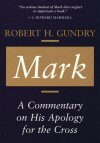
Mark: A Commentary on His Apology for the Cantankerous, vols. ane & 2
- Author: Robert H. Gundry
- Publisher: Eerdmans
- Publication Engagement: 1993
- Pages: one,124
Sample Pages: 1 | 2 | 3 | 4 | 5 | half dozen | 7
The first full-length disquisitional commentary on the Greek text of Mark to appear in English in a long fourth dimension. Gundry says that Mark constitutes a straightforward defense of the apparently shameful manner of Jesus' decease, and every bit such Marking'due south Gospel is substantially an evangelistic tract rather than an obliquely written handbook of Christian discipleship and church building life.
A major contribution to Markan scholarship . . . An indispensable resources for scholars, students, and pastors.
—John R. Kohlenberger Iii, lecturer, consultant, and adjunct instructor in Bible and biblical language, Multnomah Bible Higher and Western Seminary
Robert H. Gundry is scholar-in-residence and emeritus professor of New Testament and Greek at Westmont College in Santa Barbara, California. He is the author of the bestselling classroom text A Survey of the New Attestation.
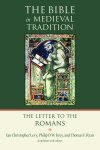
The Letter to the Romans
- Writer: Ian Christopher Levy, Philip Krey, and Thomas F. Ryan
- Series: The Bible in Medieval Tradition (BMT)
- Publisher: Eerdmans
- Publication Engagement: 2013
- Pages: 339
Ian Levy, Philip Krey, and Thomas Ryan's Letter of the alphabet to the Romans presents the history of early and medieval interpretations of Romans and gives substantial translations of select medieval commentaries. Written by eight representative medieval interpreters between the ninth and fourteenth centuries, these commentaries have never been translated into English earlier.
This valuable book volition enhance contemporary reading of the Bible fifty-fifty as information technology lends insight into medieval scholarship. Equally Levy says, the medieval commentaries showroom "qualities that many modern commentaries lack: a spiritual depth that reflects their very purpose, namely, to read Holy Scripture inside the sacred tradition under the guidance of the Holy Spirit."
A judicious selection of medieval Latin commentaries on the Epistle to the Romans. . . . Will be especially illuminating to readers interested in the history of exegesis who practise not have much background in medieval theology, for whom the interpretations may exist surprisingly rich and sophisticated. A denoting preface places the texts in helpful historical, theological, and literary contexts. Levy, Krey, and Ryan deserve our thank you for making these texts available to students of the Bible at all levels, from undergraduates to professors.
—E. Ann Thing, William R. Kenan, Jr. professor of religious studies, Academy of Pennsylvania
This volume is a labor of beloved and a souvenir given by three of the world's leading interpreters and translators of medieval biblical exegesis. . . . The chronological span taken on is breathtaking, with translations from late antiquity to the dawn of the Reformation. . . . This work altogether successfully defies the stereotype that medieval interpretation was simply parasitic upon patristic exegesis. It will be extremely valuable as a teaching tool.
—Kevin Madigan, Winn Professor of Ecclesiastical History and acquaintance dean for faculty and bookish affairs, Harvard Divinity Schoolhouse
This intelligently presented book is a model not but in its selection of texts but also for its readable (and learned) introductions and notes. The smashing interest in Romans over the centuries explains why Paul'due south alphabetic character is a classic: it provides a surplus of meaning both in the by and in the present twenty-four hour period.
—Lawrence South. Cunningham, John A. O'Brien Professor of Theology, University of Notre Matriarch
1 cannot sympathise patristic and medieval theology without careful attending to Romans. This volume, with its excellent introduction and well-counterbalanced serial of translated texts, is an impressive contribution to making the riches of medieval exegesis available to gimmicky readers.
—Bernard McGinn, Naomi Shenstone Donnelley Professor Emeritus of Historical Theology, Academy of Chicago Divinity School
Ian Christopher Levy teaches theology at Providence College. He is too editor of A Companion to John Wyclif and coeditor (with Gary Macy and Kristen van Ausdall) of The Eucharist in the Middle Ages.
Philip Krey is Ministerium of New York Professor Early Church History at the Lutheran Theological Seminary of Philadelphia.
Thomas F. Ryan is manager of the Loyola Institute for Ministry building in New Orleans and the author of Thomas Aquinas as Reader of the Psalms.
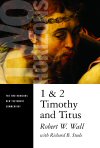
1 & 2 Timothy and Titus
- Writer: Robert Westward. Wall
- Series: The Two Horizons New Testament Commentary
- Publisher: Eerdmans
- Publication Appointment: 2012
- Pages: 432
Sample Pages: 1 | ii | iii | 4 | 5 | 6 | 7
This theological commentary on 1 & 2 Timothy and Titus past Robert Wall powerfully demonstrates the ongoing relevance and authority of the Pastoral Epistles for the church building today. Wall uniquely employs an apostolic "Rule of Religion" methodology for interpreting these texts as sacred Scripture. Iii successive historical case studies by Richard Steele vividly instantiate key themes of the Pastorals. This innovative nonetheless reverent volume will help revive the interest of students, pastors, and other Christian leaders in the Pastoral Epistles.
I commend Rob Wall for offer us, and the wider church building, his approved readings of the Pastoral Epistles. Rob does not shy away from the many tough passages in these letters, ever trying to nowadays what he sees every bit the "apparently sense" of the text in relation to other historical, ecclesial, and cultural understandings. The combination of commentary and reading past the 'rule of religion'—supplemented by three interesting example studies—provides a thorough canonical understanding of these crucial letters from the standpoint of one who is immersed in what it means to understand the Bible every bit the church'due south volume.
—Stanley Due east. Porter, president, dean of theology, and professor of New Testament, McMaster Divinity College
Those of us who are long-standing admirers of Rob Wall'due south work will recognize that the Pastoral Epistles, with all of their critical baggage, provide the perfect backdrop for his approved approach to Scripture. Wall never shrinks back from crucial questions. Nonetheless, he carefully and confidently interprets the Pastorals as full members of the canon. His readings are theologically apt and lively, shaped and regulated past the church's faith.
—Stephen Fowl, chair of the department of theology, Loyola College
Robert W. Wall is Paul T. Walls Professor of Scripture and Wesleyan Studies at Seattle Pacific University.
Source: https://www.logos.com/product/36612/eerdmans-commentary-collection